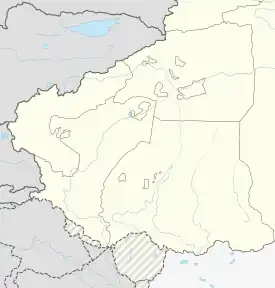Boritokay
Boritokay Township[2][3][4][5] (بۆرىتوقاي يېزىسى / Chinese: 膘尔托阔依乡; pinyin: Biāo'ěrtuōkuòyī Xiāng) is a township of Wuqia County in Kizilsu Kyrgyz Autonomous Prefecture, Xinjiang Uygur Autonomous Region, China. Located in the south of the county, the township covers an area of 4,221 square kilometers (1,630 sq mi) with a population of 6,977 (as of 2017). It has 5 villages under its jurisdiction. Its seat is at Dongengiz (墩艾额孜).[2]
Boritokay
بۆرىتوقاي يېزىسى 膘尔托阔依乡 Biao'ertuokuoyi | |
|---|---|
 Boritokay Location of the township | |
| Coordinates: 39.3230238805°N 75.0857422029°E | |
| Country | People's Republic of China |
| Autonomous region | Xinjiang |
| Prefecture | Kizilsu |
| County | Wuqia |
| Area | |
| • Total | 4,221.2 km2 (1,629.8 sq mi) |
| Population (2017) | |
| • Total | 6,977 |
| [2] | |
| Ethnic groups | |
| • Major ethnic groups | Kyrgyz[1] |
| Time zone | UTC+8 (China Standard Time) |
| Website | www |
Boritokay Township is located 86 kilometers south of the county seat Wuqia Town. It is adjacent to Shufu County in the east, Bostanterak Township in the south, Akto County in the southwest, and Oksalur Township in the north.[6]
Name
The name "Boritokay" is from the Kyrgyz language. The word "bori" (膘尔) means wolf and the word "tokay" (托阔依) means forest, brush or grassy area. According to legend, there was a forest/grassland/brushland in Boritokay in which wolves roamed and hence the area was called Boritokay, meaning "forest/grassland/brushland with wolves in it".[2][5][6][7] Xinjiang Tuzhi (新疆图志) mentions a Biaolituohai (标里托海) in the western part of Shufu, in the area of Boritokay.[8]
History
Boritokay was the 5th township of the 3rd district in Wuqia County in 1950. It was part of Bostanterak Commune (波斯坦铁列克公社) in 1958 and Boritokay Commune (膘尔托阔依公社) was formed from Bostanterak Commune in 1962, it was renamed Jinsong Commune (劲松公社) in 1968 and restored the original name in 1980, and organized as a township in 1984.[6]
Geography
Boritokay is 44 km (27 mi) south of the county seat.[7] The township is located between 1,700 meters and 2,800 meters above sea level, most of which are mountainous areas.[6]
Settlements
The township has 5 administration villages[9] and 21 unincorporated villages under its jurisdiction.[2][1]
5 administration villages:
- Akqi Village (Aheqi; 阿合奇村)
- Aygart Village (Ayiga'erte, Ayi Ga’ertecun;[10] 阿依尕尔特村) 39°24′29″N 074°43′18″E
- Boritokay Village (Biao'ertuokuoyi; 膘尔托阔依村), also named Dongengiz, (Dun'ai'ezi; 墩艾额孜村)[5]
- Saz Village (Sazi; 萨孜村)
- Targalak Village (Ta'ergalake; 塔尔尕拉克村)
Economy
It is a township of semi-agriculture and semi-animal husbandry. Local wildlife include Argali, wolves, snow chicken, stone chicken, yellow sheep and so on. Ginseng and angelica grow in the area. Mineral resources include gold, copper, fossil oil and so on. The township has an area of 469.7 hectares of arable land, 355.7 hectares of forest land and 1,677 hectares of natural grassland. All the 5 villages in the township pass through the asphalt road, and mobile communication covers all the villages. There are 2 primary schools, 4 kindergartens, 1 health center, 5 clinics and 29 medical staff in the township.[5][6]
References
- 1997年乌恰县行政区划 [1997 Ulugqat County Administrative Divisions] (in Simplified Chinese). XZQH.org. 31 December 2010. Archived from the original on 15 October 2017. Retrieved 10 October 2020.
膘尔托阔依乡 位于县城南43.5千米。面积4221.2平方千米,人口0.5万,均为柯尔克孜族。辖膘尔托阔依、塔尔尕拉克、萨孜、阿克奇4个行政村。"膘尔托阔依"系柯尔克孜语译音,意为"野狼出没的森林"。1958年成立膘尔托阔依公社,1969年更名劲松公社,1984年改设膘尔托阔依乡。东部为戈壁,地势平坦,西部为高山,山顶常年积雪。
- 乌恰县行政区划和居民地名称 (in Simplified Chinese). xjwqx.gov.cn. 2018-06-04. Archived from the original on 2020-10-08. Retrieved 2019-10-20 – via Google Cache, Internet Archive.
- huaxia, ed. (31 May 2020). "Feature: A young official's indispensable position on the Pamir Plateau". Xinhua News Agency. Archived from the original on 16 July 2020. Retrieved 11 October 2020.
Zhou Long (M) talks with two residents of Boritokay Township in the county of Wuqia, northwest China's Xinjiang Uygur Autonomous Region, April 15, 2020.
- huaxia, ed. (17 September 2020). "Full Text: Employment and Labor Rights in Xinjiang". Xinhua News Agency. Retrieved 20 September 2020.
Pashagul Keram from Boritokay Township, Wuqia (Ulughchat) County, Kizilsu Kirgiz Autonomous Prefecture
- Xie Yuzhong 解玉忠 (2003). 地名中的新疆 (in Simplified Chinese). Ürümqi: 新疆人民出版社. p. 195. ISBN 7-228-08004-1.
膘尔托阔依 Boritokay
- 膘尔托阔依乡 (in Simplified Chinese). xjwqx.gov.cn. 2018-05-31. Archived from the original on 11 October 2020. Retrieved 2019-10-21.
- Wen Hao 文昊, ed. (January 2007). 新疆地名与传说故事. 走进新疆丛书 (in Simplified Chinese). Ürümqi: 新疆美术摄影出版社, 新疆电子音像出版社. p. 46. ISBN 978-7-80744-012-3.
- Zhong Xingqi 钟兴麒, ed. (July 2008). 西域地名考录 (in Simplified Chinese). Beijing: 国家图书馆出版社. pp. 122–23. ISBN 978-7-5013-3628-9.
- 2018年乌恰县膘尔托阔依乡行政区划代码. National Bureau of Statistics of China. 2018-10-31. Retrieved 2019-10-21.
- Ayi Ga’ertecun (Approved - N) at GEOnet Names Server, United States National Geospatial-Intelligence Agency
External links
- “90后”干部周龙扶贫帕米尔 (Translation: '"Post-90s" cadre Zhou Long works to alleviate poverty in the Pamirs'. As of 2020, Zhou Long is Boritokay township deputy chief; Zhou is in charge of township poverty alleviation efforts.) (in Chinese)
- Vlog 柯尔克孜族牧民下山记 (2020) (in Chinese)